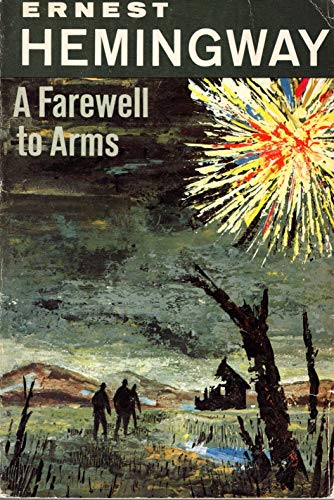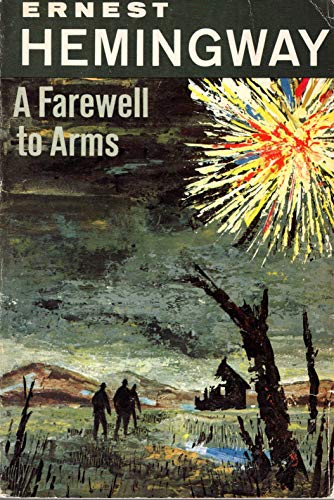
Ernest Hemingway’s novels for a long time were a staple of high school English classes and while Hemingway’s reputation has come down from the peak it once enjoyed, and justifiably so, he still can be a bracing author for an adolescent reader. We’re thinking particularly of his “A Farewell to Arms,” published in 1929, about World War I. Take this passage, the book’s beginning:
“In the late summer of that year we lived in a house in a village that looked across the river and the plain to the mountains. In the bed of the river there were pebbles and boulders, dry and white in the sun, and the water was clear and swiftly moving and blue in the channels. Troops went by the house and down the road and the dust they raised powdered the leaves of the trees. The trunks of the trees too were dusty and the leaves fell early that year and we saw the troops marching along the road and the dust rising and leaves, stirred by the breeze, falling and the soldiers marching and afterward the road bare and white except for the leaves.”
That’s practically in itself a seminar in the writing of durable and rhythmic prose.
But there’s another passage in “A Farewell to Arms” that came to mind when we heard about Utah House Bill 441, titled “Neutrality in Public Schools.” The bill was introduced on Feb. 13 by Rep. Mark Strong, a Republican from Salt Lake County who is in his first term after running on a platform of preserving freedom.
Section 2 of H.B. 441 requires all Utah schools or school districts to develop a neutrality policy, which would prohibit teachers and other employees from “advocating for or promoting controversial issues; … asserting a personal belief as fact; or … presenting facts in a biased manner.”
The rub is in how politicians define controversy. Is evolution controversial? Is climate change? For some politicians they are, still. Would it be biased for a teacher to say there’s a scientific consensus that global warming is occurring and it’s human-caused? Sadly, that seems to depend on whether you ask a politician or an educator. Or a scientist.
There’s much to be said for neutrality, but perhaps less when the camel that is the Legislature is poking its head under the tent of public education. It could be worse: We’re not Florida, yet. But it could be better, too: Of all the challenges that face Utah schools, on a list compiled by educators, we’re willing to bet that “lack of neutrality” never would appear. We don’t know where “meddling by politicians” would show up, but we think it could.
Just as we turn up our noses when religious figures endorse politicians, Americans particularly should be wary of efforts to legislate morality. Yet H.B. 441 builds on a part of Utah law that was amended last year, which states that Utah students “shall be taught … honesty, integrity, morality, civility, duty, honor, service, and obedience to law; … respect for parents, home, and family” and “the dignity and necessity of honest labor.”
This leaves us with many questions. Is working in finance on Wall Street honest labor? Is working in an Amazon warehouse? Has anyone ever, in the history of people doing things, been taught to respect their parents? How? What do lawmakers think happens in schools?
It was when we got to “morality, civility, duty, honor, service, and obedience” in Utah Code that we were reminded of “A Farewell to Arms”:
“I had seen nothing sacred,” Hemingway’s narrator says of the war, “and the things that were glorious had no glory and the sacrifices were like the stockyards at Chicago if nothing was done with the meat except to bury it. There were many words that you could not stand to hear and finally only the names of places had dignity. Certain numbers were the same way and certain dates and these with the names of the places were all you could say and have them mean anything. Abstract words such as glory, honor, courage, or hallow were obscene beside the concrete names of villages, the numbers of roads, the names of rivers, the numbers of regiments and the dates.”
While we believe there should be no objection to teaching “A Farewell to Arms” in a Utah high school, and possibly much benefit, it seems to be just what state lawmakers didn’t order: They seem not to want students to question the meanings of “duty, honor, service, and obedience.” Forget about advisable; is that even possible?
Perhaps. There was a place and a time where these sorts of things were not and could not be challenged. It was in the Germany of Hanns Johst. He was the son of an elementary school teacher, born in a village in Saxony in 1890. After studying at a university and serving in World War I, he became a playwright. In 1928, Johst joined the Militant League for German Culture, aimed at combating Jewish influences. In 1932, he joined the Nazi party, which defined culture in terms of honor, duty and sacrifice.
In 1933, when the Nazis took power, they overhauled all German public education, emphasizing discipline, obedience, family, eugenics and physical education. The politicians rewrote texts for primary and secondary schools; now, middle-school math students were asked to calculate the percentage of “Jewish aliens” in Germany. The politicos did this with widespread support among nearly all Germans, who were mysteriously eager to discard an exalted history of high culture, philosophy, liberalism and education for the cheap words of the Horst Wessel Song.
Students at German universities ransacked their libraries to collect “un-German” books. Several years before, “A Farewell to Arms” had been published in German as “In einem anderen Land.” In German as in English, the novel unmistakably condemned the pointlessness and savagery of war. The German students, who now glorified war, threw it into their bonfires with other suspect works, including books by Thomas Mann, Jack London and Helen Keller.
1933 was also the year that Hanns Johst wrote and premiered his play “Schlageter,” which was performed with fanfare on Adolf Hitler’s 44th birthday. In it, the young character Friedrich Thiemann explains why time spent studying is worthless in a world of pressing issues that require not learning but militancy. “The last thing I’ll stand for is ideas to get the better of me!” he says. “When I hear the word ‘culture,’ I release the safety on my Browning!”
The Nazis adored that line.

